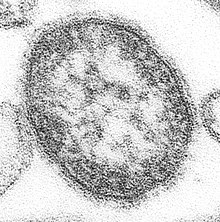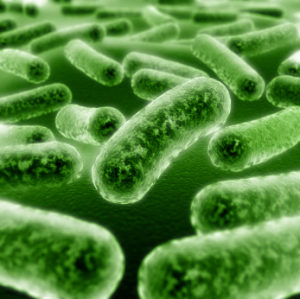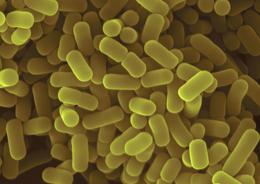 An always fatal measles complication appears to be occurring at higher rates than experts originally thought. New research found that the chance of a baby before age 1 getting measles and then the later deadly complication of subacute sclerosing panencephalitis (SSPE) is 1 in 609, while if the child got measles under the age of 5, the rate of SSPE was one in 1,367 children.
An always fatal measles complication appears to be occurring at higher rates than experts originally thought. New research found that the chance of a baby before age 1 getting measles and then the later deadly complication of subacute sclerosing panencephalitis (SSPE) is 1 in 609, while if the child got measles under the age of 5, the rate of SSPE was one in 1,367 children.
SSPE is a neurological disorder that is a rare long-term complication of measles, typically appearing 4 to 8 years after the measles infection. First there are behavior changes, and later seizures, which progressively get more severe. Death usually occurs between 1 and 3 years after diagnosis. The researchers said that many of the patients studied had been vaccinated on time, but had measles in the first year of life, before the vaccine could be given. This rare disorder is a good reason to get the measles vaccine, but it was apparently too late for those that were diagnosed with measles or a "measles-like rash and illness" in the first 12 months of life.
What to do? Children should get measles vaccine at the normal time (12 to 15 months of age), but infants between 6 and 11 months should get the measles vaccine prior to travel to an area with measles. Infants younger than that should not travel to an area with measles. The researchers pointed out that SSPE demonstrates the "high human cost of “natural” measles immunity". As the researcher Dr. james Cherry said: "The new findings are "really frightening." Yup. From Live Science:
Deadly Measles Complication More Common Than Doctors Thought
A deadly complication of the measles, which can occur years after a person is infected with the virus, is more common than researchers previously thought, according to a new study. The complication, called subacute sclerosing panencephalitis (SSPE), is a progressive neurological disorder that involves inflammation in the brain.
People with SSPE die, on average, within one or two years of being diagnosed with the disease. Some people may live longer, but the condition is always fatal, according to the U.S. National Library of Medicine.
Previously, researchers thought the risk of post-measles SSPE was one in 100,000, according to the study. But the new analysis suggests that kids who get the measles before age 5 have a one in 1,387 chance of developing SSPE, and kids who get the measles before age 1 have a one in 609 chance. In the study, the researchers looked at all of the cases of SSPE in California that occurred between 1998 and 2015, identifying 17 cases. The children were diagnosed with SSPE, on average, at age 12, the researchers found. However, some children were diagnosed when they were as young as age 3, and others, as old as age 35.
When someone gets sick with the measles, the body usually rids itself of the virus in about 14 days. In rare cases, however, the virus can spread to the brain but go dormant. Scientists don't know why the virus becomes active again, but if it does, it leads to SSPE. SSPE is thought to occur in three stages, study senior author Dr. James Cherry, a distinguished research professor of pediatrics at the David Geffen School of Medicine at the University of California, Los Angeles, said at a press conference today (Oct. 28), here at IDWeek 2016, a meeting of several organizations focused on infectious diseases.
In the first stage, a person with SSPE may act a little differently, Cherry said. If the patient is a child in school, he or she may not do as well, or may act aggressively, Cherry said. The behavioral changes can be subtle, he added. In the second stage of SSPE, a person will have seizures, Cherry said. These seizures can be subtle at first; for example, a person may faint, but in fact he or she is having a seizure, Cherry said. As the disease progresses, the seizures become more common and more pronounced, he said. In the final stage, seizures occur constantly, and the person eventually becomes comatose, Cherry said. Of the 17 cases of people with SSPE identified in the new study, 16 have died and one person is receiving hospice care, Cherry said.
Indeed, the measles vaccine is the only surefire way to prevent this type of infection, Marshall said. However, because the first dose of the measles vaccine isn't given until a child is between 12 and 15 months old, children younger than 1 year are susceptible to the disease. To protect these children, as well as people who, due to medical reasons, can't be vaccinated, everyone else needs to get the vaccine, Cherry said. This would create herd immunity, he said. Herd immunity is what protects babies, Marshall said at the press conference. But there's a threshold to herd immunity, he added. If the proportion of people who are vaccinated dips below a certain rate, herd immunity no longer comes into effect, he said.
 An electron micrograph of the measles virus. Credit:Wikipedia
An electron micrograph of the measles virus. Credit:Wikipedia
 Child showing a 4-day measles rash. Credit: Wikipedia
Child showing a 4-day measles rash. Credit: Wikipedia
![]()
 Another study finding a link with low levels of vitamin D and a health problem - this time an increased risk of bladder cancer. Vitamin D is frequently called the "sunshine vitamin" because sunlight is the best source of vitamin D (our body makes vitamin D3 from sunlight exposure on our bare skin). If you take vitamin D supplements, look for vitamin D3 (rather than D2). From Medical Xpress:
Another study finding a link with low levels of vitamin D and a health problem - this time an increased risk of bladder cancer. Vitamin D is frequently called the "sunshine vitamin" because sunlight is the best source of vitamin D (our body makes vitamin D3 from sunlight exposure on our bare skin). If you take vitamin D supplements, look for vitamin D3 (rather than D2). From Medical Xpress:
 Could certain beneficial bacteria (probiotics) help prevent or deal with infections in burn wounds?
Could certain beneficial bacteria (probiotics) help prevent or deal with infections in burn wounds?  Lactobacillus plantarum Credit: Nature
Lactobacillus plantarum Credit: Nature Eating lots of fruits and vegetables (more than 10 servings a day!) is linked to better cognitive functioning in both normal weight and overweight adults (both young and older adults), and may delay the onset of cognitive decline that occurs with aging and also dementia.
Eating lots of fruits and vegetables (more than 10 servings a day!) is linked to better cognitive functioning in both normal weight and overweight adults (both young and older adults), and may delay the onset of cognitive decline that occurs with aging and also dementia.  An electron micrograph of the measles virus.
An electron micrograph of the measles virus.  Child showing a 4-day measles rash.
Child showing a 4-day measles rash.  There are many posts on this site about the microbes within us (the microbiome) or around us, but the following article may be a real eye opener. Due to the permafrost melting (as in Alaska, northern Canada, Siberia, etc) from global warming, old infectious viruses and bacteria might be released from the thawing permafrost. This is what recently happened in Siberia, where melting permafrost released anthrax spores which killed 2300 reindeer and a 12 year old boy, and sickened at least 20 other people. From Scientific American:
There are many posts on this site about the microbes within us (the microbiome) or around us, but the following article may be a real eye opener. Due to the permafrost melting (as in Alaska, northern Canada, Siberia, etc) from global warming, old infectious viruses and bacteria might be released from the thawing permafrost. This is what recently happened in Siberia, where melting permafrost released anthrax spores which killed 2300 reindeer and a 12 year old boy, and sickened at least 20 other people. From Scientific American: Bacillus anthracis - Anthrax bacteria
Bacillus anthracis - Anthrax bacteria  Skin anthrax lesion on the neck
Skin anthrax lesion on the neck  Another study finding brain changes from playing tackle football - this time measurable brain changes were found in boys 8 to 13 years old after just one season of playing football. None of the boys had received a concussion diagnosis during the season. The changes in the white matter of the brain (and detected with magnetic resonance imaging (MRI) were from the cumulative subconcussive head impacts that occur in football - the result of repetitive hits to the head during games and practices.
Another study finding brain changes from playing tackle football - this time measurable brain changes were found in boys 8 to 13 years old after just one season of playing football. None of the boys had received a concussion diagnosis during the season. The changes in the white matter of the brain (and detected with magnetic resonance imaging (MRI) were from the cumulative subconcussive head impacts that occur in football - the result of repetitive hits to the head during games and practices.
 Lead exposure is a big problem for children throughout the United States and the rest of the world - whether lead from plumbing, lead paint, lead solder, and even from nearby mining. There are no safe levels of lead in children (best is zero) because it is a neurotoxicant - thus it can permanently lower IQ scores as well as other neurological effects. More lead gets absorbed if the person also has an iron deficiency than if the person has normal iron levels.
Lead exposure is a big problem for children throughout the United States and the rest of the world - whether lead from plumbing, lead paint, lead solder, and even from nearby mining. There are no safe levels of lead in children (best is zero) because it is a neurotoxicant - thus it can permanently lower IQ scores as well as other neurological effects. More lead gets absorbed if the person also has an iron deficiency than if the person has normal iron levels. Many articles have been written about
Many articles have been written about